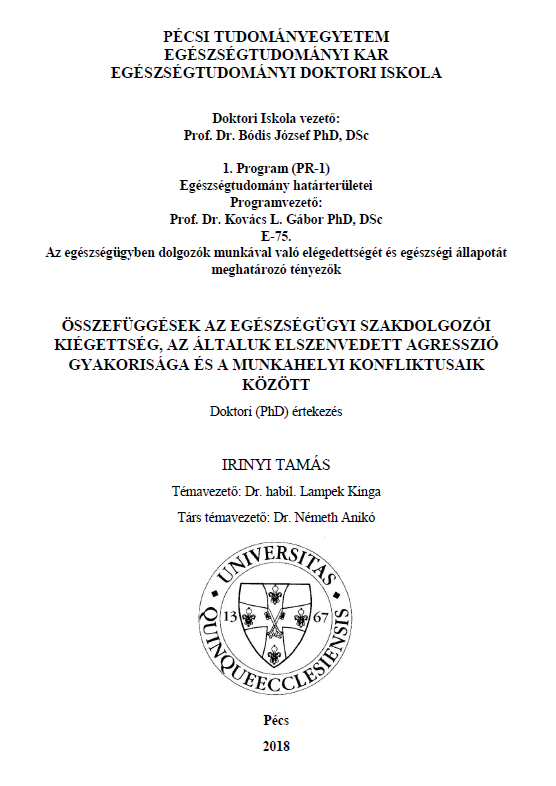Összefüggések az egészségügyi szakdolgozói kiégettség, az általuk elszenvedett agresszió gyakorisága és a munkahelyi konfliktusaik között
Abstract
Numerous international and national publications are underpinning the notion that burnout is very common among healthcare providers. The most dominant risk factors are the emotional burden during helping others, furthermore fear, depression and fatigue. Nevertheless, there are also several factors related to the workplace playing serious role in the development of the symptoms. The syndrome is characterized by fatigue, hesitation, inactivity, sleep disturbances, tiredness, despair, hopelessness, emotional emptiness, irritability, pessimism and negative attitudes.
Violent acts committed by patients or their relatives are another common, but less well studied area in Hungary. These can be manifested in the form of physical aggression (behaviour causing or threatening physical harm towards others) or in non-physical aggression ranging from sexual abuse to verbal aggression. The verbal form is twice or three-times more frequent than the physical. The causes can be manifold; the patientss or their relative might be under the influence of alcohol or drugs, mentally ill, unsatisfied with the service, faced with bad news or sometimes they have to wait for long hours. There are work-related factors, too, e.g. overload, lack of social support, lack of workforce, low sense of autonomy and burnout. Aggression can cause pain, the result might require medical attention, and it can lead to stress, fear, phobias, sleep disturbances, low self-esteem, substance abuse (alcohol or drugs), absence from work, committing violence, resentment and “I cannot nurse” attitude. Psychological well-being worsens, burnout and dissatisfaction with work become more frequent and the patient-nurse relationship is also affected.
The third area of interest in the present paper is the prevalence of workplace related conflicts. Conflict among nurses has been identified as a priority problem in healthcare. There are many reasons behind this phenomenon, e.g. non-appropriate communication, dissatisfaction with work, high level of work-related stress and burnout. Conflicts among doctors and nurses are also quite frequent stemming from hierarchical differences, unclear roles and different amount of experiences. Workplace related conflicts are destructive from the perspective of the employees and the workplace, too. It can cause stress, anxiety, lowers the performance of the individuals and the team, decreases morals and fame in the team, increases burnout and the possibility of malpractices and professional changes.
Nurses who are less affected by burnout tolerate the violent behaviours of patients or relatives better. Furthermore, physical and non-physical aggression can be regarded as a predictive factor in the development of burnout. Victims of violence have higher levels in two dimensions of burnout: emotional fatigue and depersonalization. The level of depersonalization increases with the severity of aggression, while the personal performance decreases.

